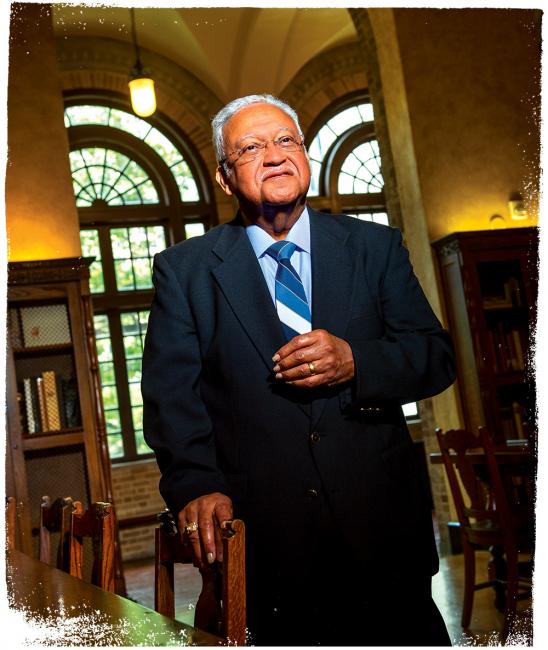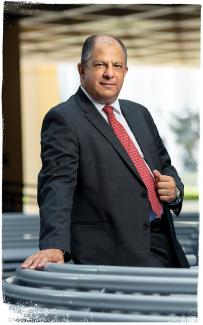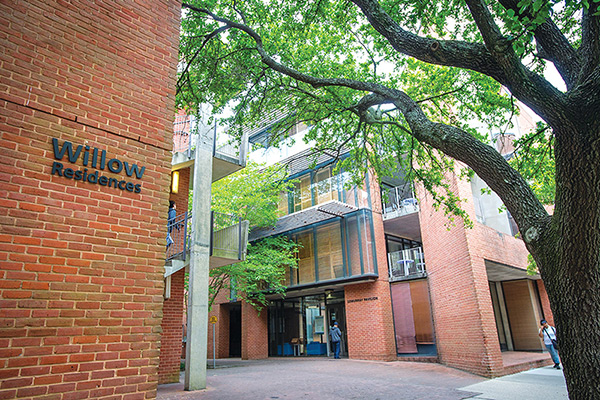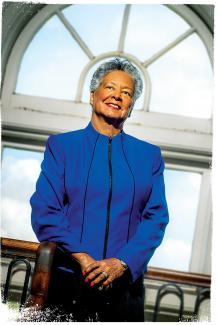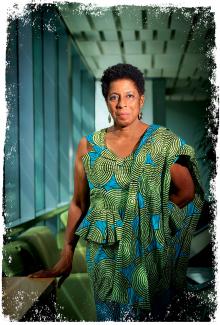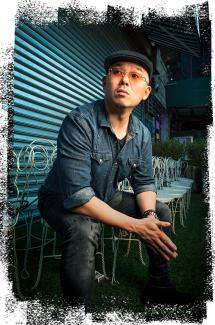Above photo: Reynold T. Décou (A&S ’67, ’79) photographed in the Julia Ideson Public Library in Houston, Texas. (Photo by Paula Burch-Celentano)
The story of Tulane University would not be complete without the contributions of many important people from diverse backgrounds who have made a substantial and lasting impact on our campus. The Committee on Campus Recognition, in an ongoing, campuswide effort to recognize those individuals, solicited nominations of Tulanians who have made our university what it is today. In April, President Mike Fitts announced an exciting new initiative to honor the first five of these Tulanians.
This effort began with the announcement of the intent to name prominent campus locations and programs after pioneering alumni and other Tulanians who led the way in the university becoming a more inclusive, diverse and welcoming community.
The Board of Tulane approved naming Willow Residences, currently designated for the street on which they sit, in honor of the first African American undergraduates to earn degrees from Newcomb and Tulane, respectively: Deidre Dumas Labat (NC ’66, G ’69) and Reynold T. Décou (A&S ’67, ’79).
The Office of Multicultural Affairs and the Office of Gender and Sexual Diversity, as well as their new space in the Richardson Building, will be named the Carolyn Barber-Pierre Center for Intercultural Life in honor of the campus pioneer whose decades of dedication to the Tulane community have been instrumental in its movement toward greater inclusion.
Over the course of the academic year, the university will celebrate these new designations with special ceremonies and celebrations while recognizing many other great Tulanians, including Bobby Yan (TC ’95), a six-time Emmy Award winner and the founder of Tulane’s Asian American Student Union, for whom the Bobby Yan Lecture in Media and Social Change will be named; and Luis Guillermo Solís (G ’81), for whom a professorship will be named.
Here are the stories of the first five Tulane pioneers who will be honored.
Reynold T. Décou
At a time when large state universities were publicly, and sometimes violently, desegregating, Tulane administrators set about integrating the university. Among the first students recruited by Tulane was a St. Augustine High School New Orleans senior named Reynold T. Décou (A&S ’67, ’79).
Décou already had a tentative plan to attend college on the East Coast. His career goal was to become a physician. So, when two Tulane deans arrived at the high school and personally invited Décou to enroll at Tulane, and mentioned the potential for a scholarship in his second semester, it was a surprise.
Décou said that at that time he was well aware of the events surrounding the integration of some other Southern universities.
He was swayed by Tulane’s reputation, but also made the decision out of respect for his family, who would shoulder a financial burden by sending him to college on the East Coast. His parents were cautiously optimistic about the agreement. He registered at Tulane for the summer 1963 semester, taking 10 hours of calculus before the fall semester began.
In August he moved into a dormitory, where patterns of intimidation by the student body began the very day he arrived. Name-calling, messages of hate, unpleasant “gifts” left at the door: “I took this all in stride, confided in just a couple of students who had befriended me, and never told my parents until years later,” Décou recalled in 2014.
When he arrived at Tulane, he was still only 17. But even at that age, he said he was still fixed on his goal, to complete his education at Tulane.
Reflecting on his experiences, Décou said, “It’s a process. You have to go through this. It’s just like when you’re building a freeway, there’s just a lot of disruption, because that’s the theme for progress.”
Décou left the dorm for good in November 1963, although after the fall semester the episodes of abuse dwindled. He continued on at Tulane, entering the Air Force ROTC and pursuing a pre-med curriculum until he decided to switch to geology. He graduated from Tulane in 1967 with a Bachelor of Science and also attended Tulane graduate school in the geology program prior to his employment.
“I had some things that almost at times brought me to tears,” he said. “But at the same time, I said, ‘I have a goal to achieve, I can see that light at the end of the tunnel.’ And I had the support that I thought I needed to go forward from my family and from the administration. And even though I had experienced [intimidation] … it did not stop my momentum.”
After a commission with the U.S. Air Force, Décou worked as a petroleum geologist, traveling the world. He settled in Houston, where he still lives, and is semi-retired and active as a geological consultant.


